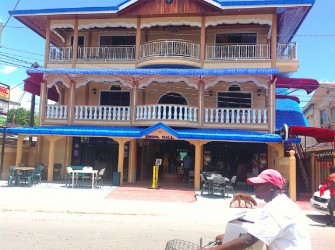There is a sense in which New Amsterdam’s recently commissioned four-storey Bristol Shopping Mall and Restaurant (the proprietor sometimes favours the more long-winded title Bristol-Apollo Lounge, Canje Pheasant Restaurant and Mini Mall) defies the widely-held notion that social and political instability in Guyana serves as a disincentive to attracting Guyanese in the diaspora to invest here.
Charles Bristol-Henry sunk his life’s savings into building New Amsterdam’s first shopping mall in the teeth of advice to the contrary from friends and associates. For him, the completion of the facility and its commissioning last Friday by Prime Minister Samuel Hinds symbolise the triumph of determination over scepticism.

The venture, he says, was no ‘walk in the park.’ After he had completed the first two storeys of the mall he had to open the facility—comprising eight units on the ground floor—to stallholders in order to acquire the funding to complete the project. Rentals from those stalls helped to provide part of the rest of the capital for what Bristol-Henry says is a $200 million investment.
The completion of the venture, Bristol-Henry says, marked the culmination of a dream nurtured during his years working in the United States, mostly as a technician with the internationally renowned company Verizon. Currently in his seventies and having re-migrated to New Amsterdam a year ago, Bristol-Henry appears to have settled into his new life as an entrepreneur.
The mall cuts an impressive figure at the corner of Main Street and Lad Lane. Its eight ground floor trading spaces are occupied by small businesses that include a snackette, a hair-dressing salon, and office and a DHL outlet. The second floor houses a restaurant, the third, the Apollo Lounge, a Sports Bar facility and the fourth a VIP lounge designed for upscale entertainment.
Apart from the eight rented trading spaces on the ground floor Bristol-Henry runs the other businesses in the complex.
The criticisms which the investment has attracted among Bristol-Henry’s ‘advisors’ include the observation that the Berbice River Bridge has shifted the commercial focus of the area away from New Amsterdam. Bristol-Henry sees it differently. First, he believes that it is precisely through investments like his own that the commercial life of New Amsterdam will be sustained. More than that, he contends that the onus is on him to make his investment sufficiently successful to transform the perception that New Amsterdam is no longer viable as a centre for commerce.
A former technician, Bristol-Henry returned to Guyana four years ago for an uncle’s funeral. It was during that visit that the idea of constructing the present facility on a plot of land that once housed his mother’s home occurred to him.
Not one to encourage unhealthy competition and potential confrontation among his tenants Bristol-Henry has instituted a rule of tenancy that does not allow for rental of trading spaces to businesses that are in competition with each other. His tenants, he says, also prefer it that way.
Bristol-Henry says that those enterprises inside the complex which he operates as his own businesses will be seeking to significantly raise standards in the local food and entertainment sectors. Accordingly, he has recruited the services of Kate Archer, a retired Home Economics instructor as an advisor.
Seemingly a pragmatist, Bristol-Henry is under no illusions regarding the challenges he could face in seeking to make his investment work.
However, he appears to be driven by the conviction that fate and his own determination would not have had him come this far only to have success elude him.





